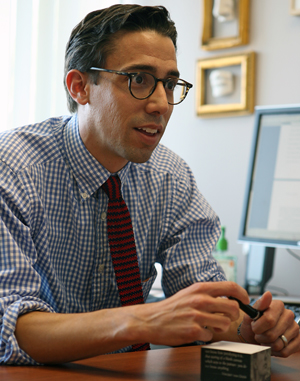Decoding a Bestseller
English Professor Honored for Article on ‘The Da Vinci Code’
May 29, 2012
Published with little fanfare in 2003, "The Da Vinci Code" quickly vaulted to the top of the bestseller list, where it remained for more than two years, beating all competition but Harry Potter.
 Caption: Stephen J. Mexal. Photo: Greg Andersen Download
Caption: Stephen J. Mexal. Photo: Greg Andersen Download
By wedding what Stephen J. Mexal calls “a paranoiac’s obsession with secret societies and the Roman Catholic Church to the action-movie adventures of Harvard ‘symbologist’ Robert Langdon,” author Dan Brown’s popular novel “has become a public document that tells us much about the status of historical narrative in the age of globalization.”
Mexal, assistant professor of English, comparative literature and linguistics, examined Brown's thriller for the Journal of Popular Culture. And, his article, “Realism, Narrative History, and the Production of the Bestseller “The Da Vinci Code’ and the Virtual Public Sphere,” has received the Russel B. Nye Award for the Outstanding Article published in the Journal of Popular Culture in 2011.
“Professor Mexal joins distinguished winners of this award,” said Sally Sugarman, vice president for the Popular Culture/American Culture Association awards. “The criteria which the committee uses are whether the article presents a provocative and persuasive argument, whether it has substantive research and sound methodology, whether it has an effective prose style and whether the article makes a meaningful contribution to the study of popular culture. This article excelled in all four areas.”
Mexal accepted the award last month in Boston and called it “a terrific surprise and honor.”
“ ‘The Da Vinci Code’ isn’t exactly high literature — it won’t be replacing ‘Hamlet’ on English syllabi any time soon — but it’s an important book all the same. It’s the best-selling American novel of all time, and it’s always worth reading and thinking about books that play such a prominent role in our increasingly globalized popular culture,” he said.
The gap between the academic writing of history "and public perceptions of that historiography is apparently a wide one,” Mexal writes at the conclusion of his award-winning essay. “Although academic historians long ago abandoned the pretense of discovering a single, authoritative historical master narrative, the lay public has not relinquished that romantic view.”
Brown's book “reveals the fictional and the historical to be interrelated narrative discourses,” Mexal writes.
“Because it claims to weave a complex blanket of fictive and historical narrative threads, 'The Da Vinci Code' reveals to a global public the degree to which history is always contested and constructed. Yet, in so doing, it also encourages the reader to enter into active dialogue, not only with the text, but also with a broader public,” he continues. “By participating in this virtual public sphere and debating the nature and coherency of narratives fictional and historical, the reader ultimately images him or herself as an agent of a new postnational history.”
